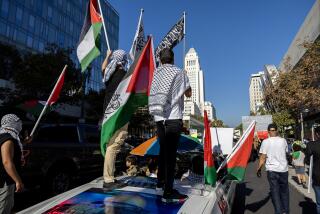Young West Bank Arabs Want Decisive Action by PLO--or Else
- Share via
BATTIR, Israeli-Occupied West Bank — Young Arab activists in this West Bank village answer as one might expect when asked what they want from the meeting of Palestinian leaders that began this weekend in distant Algiers.
They exude confidence that the Palestine National Council, the parliament in exile of the Palestine Liberation Organization, will declare an independent state for them on the West Bank and Gaza Strip.
In so doing, the youths remark, the PLO will have moved to translate the sacrifices of rebellious Palestinians here into diplomatic gains and perhaps peace talks with Israel, which occupies the land they live on.
But the young Arab men make another, more aggressive point. If the PLO council fails to satisfy them, the youths will continue their battle without the guidance of the organization.
‘The PLO Works for Us’
“Enough meetings. The PLO works for us,” said Mohammed Awina, who works in a hotel in Jerusalem. “We want to know what we are. We need the world to be told we are Palestinians.”
Added Yusef Aisa, an employee of an auto parts shop: “We are here. We want a solution and peace. Every day, one, two, three or more good guys, the flower of our youth, die in our fight against Israel.
“If the meeting does not produce anything,” he continued, “who needs it?”
This is tough talk considering that, traditionally, Palestinians who criticize the PLO have been silenced by the bullet or bomb. But these Palestinians--hardened by 11 months of intifada , or uprising, against Israel--are flexing their muscles.
Their attitudes reflect subsurface tensions between Arabs “inside” Israeli-controlled land and those “outside,” especially the PLO leaders. The insiders feel clear about what they want--an end to the occupation--and have shed blood to get it. They view the outsiders--those who live beyond the bounds of Israeli control--as frozen in their thinking and prone to self-defeating internal squabbles.
“There is a big difference between the ones who are getting shot at every day and the ones who just give directions. If there were no intifada , there would be no (PNC) meeting,” Ismeh Awina, an unemployed house painter, told visiting reporters.
Battir, a village built around a gushing natural spring, hugs the border between the occupied West Bank and Israel. Two village youths have been killed in clashes with Israeli troops during the intifada and numerous homes ransacked in searches for stone-throwing rebels.
On Saturday, the village, like the rest of the West Bank and Gaza Strip, was sealed off from Israel. Israeli soldiers manned roadblocks and turned back Arabs trying to enter Israel for work, and troops patrolled the territories.
In an unusual move, Israeli army units took up positions in Jerusalem’s Old City, which contains important religious sites of the Jewish, Christian and Muslim faiths, as well as most Arab neighborhoods in the city. Soldiers also rounded up scores of Arab activists in the West Bank and Gaza in an effort to head off protests.
The Gaza Strip was put under curfew, and added army patrols were sent into the heavily populated zone. “We are talking about forces whose scope gives them the ability to reply to any disturbance or violation of the law in the area,” said Gen. Yitzhak Mordechai, military commander of the coastal area.
Earlier in the week, the underground unified command of the uprising called on its followers to mark the Algiers meeting by stepping up anti-Israel violence, raising Palestinian flags, mourning fallen rebels and scrawling graffiti on every available wall.
Battir responded by painting a large red, white, green and black Palestinian flag on a cliff and hanging a small cloth banner on its lone mosque. Some youths also posted pictures of Israeli Prime Minister Yitzhak Shamir defaced with donkey’s ears.
More to Read
Sign up for Essential California
The most important California stories and recommendations in your inbox every morning.
You may occasionally receive promotional content from the Los Angeles Times.










